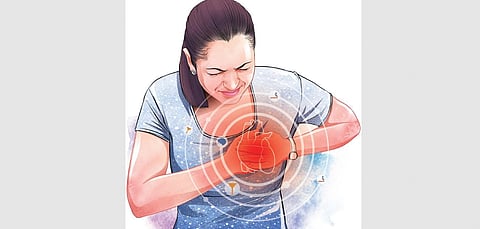

KOCHI: Not long ago, coronary artery diseases were primarily a problem faced by older adults. Now, heart-related diseases have been on the rise among young people, especially symptomatic coronary artery disease. They are usually detected when acute chest pain or a heart attack is experienced. Studies have also found that Indians are at high risk of coronary artery disease.
Earlier, the majority of the sudden cardiac deaths happened in individuals above the age of 35. Nowadays heart attacks and sudden deaths are likely to occur at an age less than 35; However, when a young person dies suddenly, the cause is usually not related to blockages in the arteries of the heart.
Are sudden cardiac deaths preventable?
Sudden cardiac death happens within a few minutes or hours after the onset of new cardiac symptoms. The new symptom, which can be a harbinger of imminent death, may be chest pain, acute breathlessness, or short episodes of loss of consciousness. Since these warning signals often occur in patients already suffering from heart disease, the chances of such signals getting overlooked by the patient are high. Identifying who is at risk and receiving proper treatment can help prevent sudden deaths in high-risk individuals.
How to reduce the risk
The most effective strategy is following a healthy lifestyle, detecting heart disease at the earliest and proper medical care. Early evaluation for chest pain and emergency angioplasty may also prevent sudden deaths. For young patients who suffer loss of consciousness or ECG abnormalities detected on routine screening, specialised referral and evaluation are required.
Doctors can now identify patients at particularly high risk for sudden cardiac death. There are several options to eliminate or significantly reduce the risk, and implantable defibrillators are one such option. They are small pacemakers that can monitor and treat dangerous heart rhythms. The device is implanted through a keyhole procedure and requires only mild sedation and a single day in the hospital.
For patients with decreased pump function, special pacemakers with wires that extend to the three chambers of the heart can significantly improve heart function and prevent future risks. This is called cardiac resynchronisation. There are many more sophisticated treatment options, but these keyhole procedures can sustain life and reduce the need for hospitalisation.
Not all sudden deaths are heart attack-related
The majority of the sudden deaths that occur are not related to an ongoing or acute heart attack. Many of the patients who experience sudden cardiac death may, in fact, have scars on the heart from previous heart attacks. For some, sudden cardiac arrest leads to unconsciousness and this causes death. With prompt care, life can be saved. Also, sudden death occurs quite frequently in patients with no known heart disease, sometimes even without any warning signs. Such patients may have a history of loss of consciousness or a history of unanticipated deaths in close relatives.
Doctors who specialise in sudden death research have identified specific abnormalities of heart rhythm, (without any other heart disease) that are associated with the risk of sudden death. This includes abnormal heart rhythm while swimming, exercising, or even during sleep or rest (e.g., Brugada syndrome). Also, family history of sudden deaths, past events of abrupt loss of consciousness, and ECG abnormalities help the physician identify such rhythm disorders before a fatal event. Once identified there are effective ways to prevent deaths.
As per studies, most preventable sudden deaths occur in patients with heart disease. Recent or old heart attacks, which result in decreased heart pump function (heart failure), are the leading causes of sudden death. In fact, heart failure due to any cause increases the risk of sudden death.
Can COVID-19 cause sudden death?
Cardiac complications, heart attacks, inflammation of the heart muscles, and sudden deaths have been reported with COVID-19 infection, especially in severe cases. During the Covid wave, there has been an increase in sudden deaths in the community.
The writer is a senior consultant at the Department of Cardiology and Electrophysiology in KIMSHEALTH